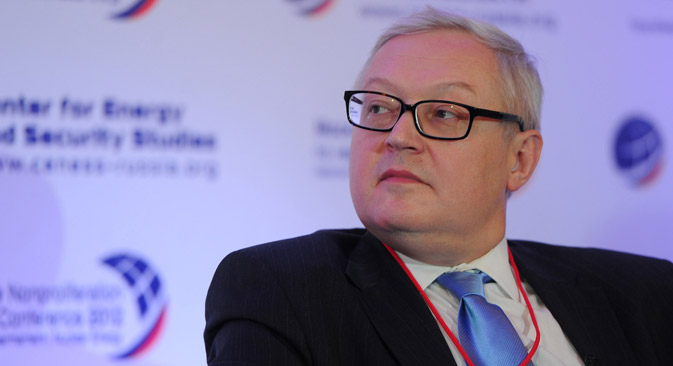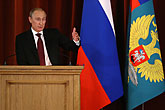Ryabkov on Russian-U.S. relations: ‘We will not respond symmetrically’

Sergei Ryabkov: 'We will not be dragged into an arms race'. Source: ITAR-TASS
About economic pressure
We know for a fact that the U.S. administration put pressure on its allies and on entrepreneurs of a certain level to avoid forums and events that were important for Russia… This is a deconstructive process. It certainly has no effect on our political course, however, it puts bilateral relations between Moscow and Washington in a deadlock.
The U.S. has withdrawn from particular formats of dialogue and collaboration with us that in the past had proven to be very effective. First of all, they concern the bilateral presidential commission and dialogue on economic matters. The U.S. administration believed this dialogue was not necessary. I did not think that issues of trade, investment and access to markets could so easily fall victim to geopolitical considerations.
Sanctions as a strategic weapon
Now the market is being transformed into a foreign policy instrument. Prohibited measures are being used, ones that have in nothing common with market interests and economic efficiency. It is all related to the geopolitical objectives of containing or even discarding a country, or countries, whose foreign policy or other aspect does not please the U.S.
There is a series of other alarming manifestations of this mentality: in particular, the broad implementation of sanctions, including measures to limit banks from carrying out their normal economic activity. This is nothing but a new offensive, and even strategic, weapon of U.S. foreign policy.
We have the impression that Washington has realized that it is sometimes easier and cheaper to implement sanctions than to use traditional military force on someone. That is, we are witnessing the use of a new type of offensive weaponry.
On Russia's reaction to the sanctions
We will not be dragged into an arms race. We will not respond symmetrically to all the steps that have been taken against us. We will not. But we are obliged to seek an antidote. To counter the offensive weaponry we will find defensive weaponry. This is what we will do.
I would like to stress that we are not aiming to ruin any element of our relations with the U.S. We do not want to act like the U.S., even in respect to what is happening or to that unpleasant anti-Russian policy that lies at the heart of Washington's recent decisions regarding Russia.
On the prospects of bilateral collaboration
The interests of two countries in times of disagreement, or even opposition, should not generate arguments, conflicts, contradictions and crises.
These interests are so broad that there exist areas in which collaboration is not only possible, but also necessary.
There are regional crises. But there are also issues related to scientific and technological progress in important areas such as the atom and the cosmos. We will definitely continue our humanitarian activity. For example, we also have a directive, which no one has cancelled, about gradually establishing a visa waiver program for Russian and U.S. citizens.
On the reasons for the tensions in relations
There is only one reason: Washington's policy. The U.S. believes that it won the Cold War and Russia, which is the continuation of the Soviet Union, lost it. From this they deduce that Moscow must now obey and behave as a younger partner in international affairs, as well as in its interaction with the U.S. Essentially, this annuls the possibility of us having our own national interests. It annuls the possibility of us having a value system that is different from America's or that of other western countries.
New instincts have prevailed in the White House and in Congress, instincts to punish Russia for that which, according to them, it did wrong. Many politicians on Capitol Hill do not have the slightest desire to understand the issues of Russia's interest.
On nuclear weapons and missile defense
We are continuing the rigorous implementation of the New START 2010. This means that there is no more accumulation of strategic offensive arms, that there is trust and transparency. Currently, Russia's and the U.S.'s nuclear potential is lower than it has been in the last decades.
The transparency in this area is very impressive. However, as regards the NPT [Non-Proliferation Treaty], there has been no progress towards an agreement and so far this is not expected.
Collaboration regarding Iran
I personally do not think that there are any grounds to fear that the Ukrainian situation will undermine the negotiations on Iran's nuclear program, destroying their effective course. We believe that our American colleagues, as well as the EU participants in this process, share our and China's conviction that everyone will only benefit from this agreement.
First published in Russian in Kommersant.
Read more: Vitaly Churkin: Crisis in Ukraine may lead to humanitarian catastrophe>>>
All rights reserved by Rossiyskaya Gazeta.
Subscribe
to our newsletter!
Get the week's best stories straight to your inbox


